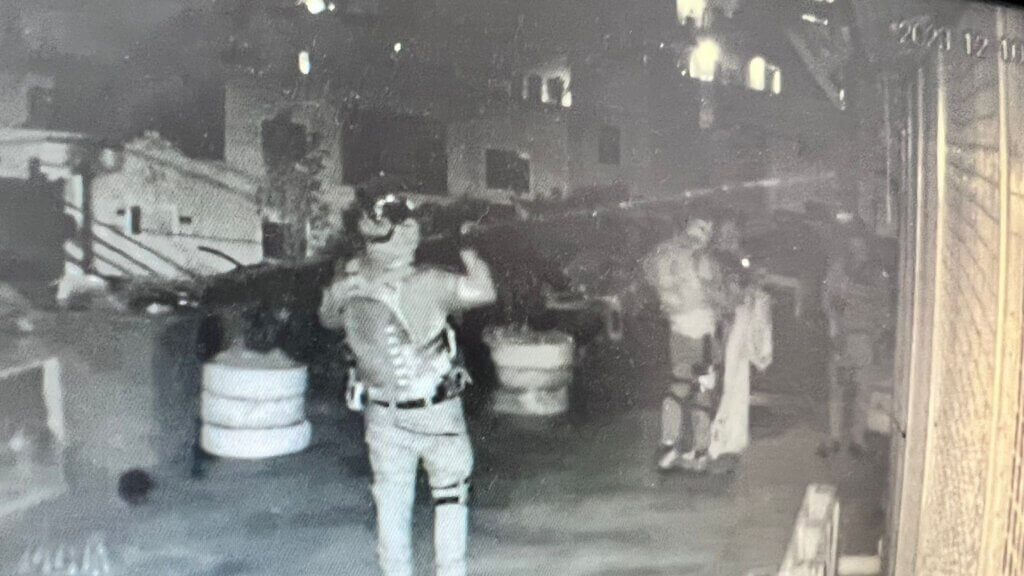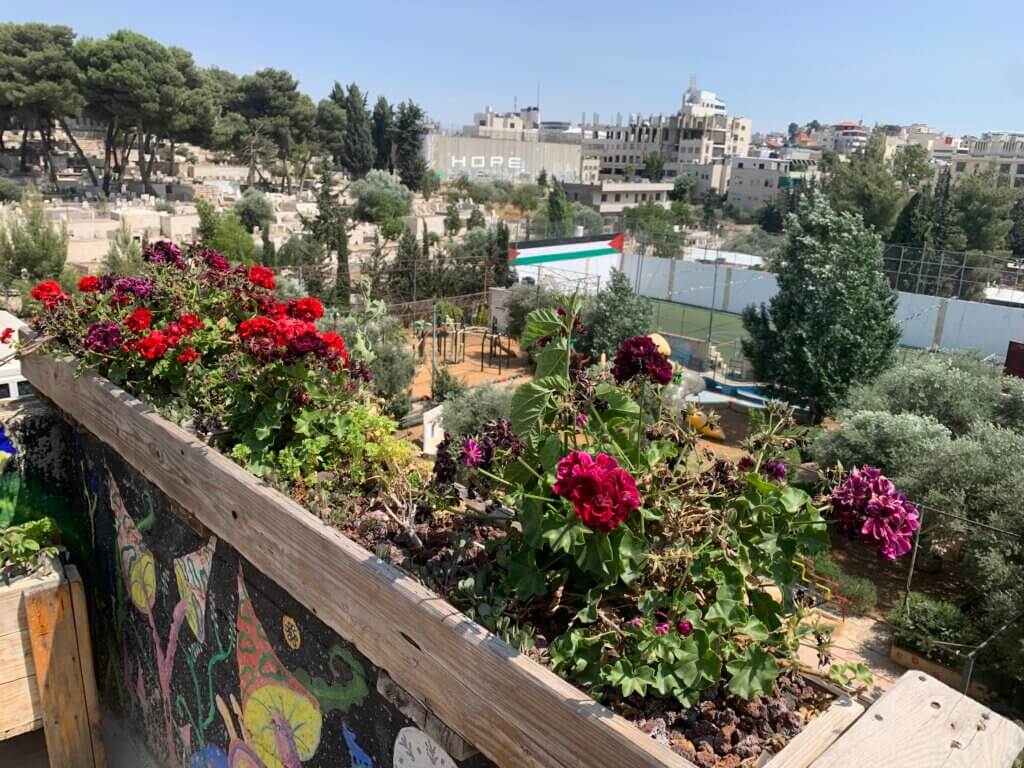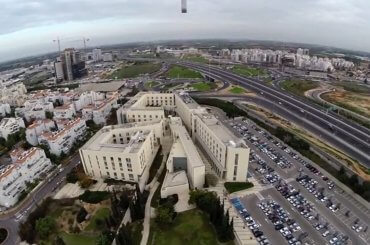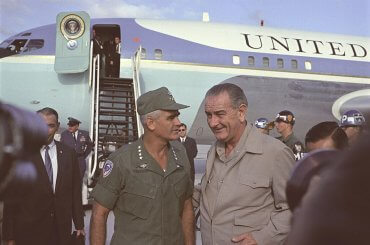On December 10 at 1:15 a.m., Israeli Occupation Forces (IOF) broke down the door of Lajee Center, a community organization for Palestinian refugees based in the West Bank. Soldiers then proceeded to invade the building by going to their rooftop, sawing off the four-meter flagpole, and removing the Palestinian flag. Then, they stole the pole and put up an Israeli flag on the military base overlooking Aida camp. Lajee Center’s official page reported, “This heinous act was not only a form of intimidation but also to express the power they have over freedom of expression of anything Palestinian.” This action is consistent with the long history of Israel banning the Palestinian flag and targeting symbols such as the keffiyeh and, more recently, the horse sculpture in Jenin, because of what they represent.
Even with the guns they have, they are still really weak.
“They are trying to project an image of victory by taking the Palestinian flag off and by putting up the Israeli flag… I was annoyed but, at the same time, proud that even with the guns they have, the weapons that they own, they are still really weak. They are nothing,” a community member at Aida refugee camp told me.
Violent acts like this are nothing new in Aida refugee camp as it is the most tear-gassed place on earth. I spent my summer in Bethlehem interning at Lajee Center, and when my friends shared this latest update among a sea of others, I could not help but reflect on the beauty and resilience of each person I know there. “We have put up the flag again,” Mohammad Alazza, the Executive Director told me within hours of discovering what the IOF had done. In 2013, Alazza, previously the Media Director at Lajee Center and a photojournalist, was shot in the face for taking photographs of soldiers during one of countless invasions into Aida camp. Knowing him, nothing will break his spirit of steadfastness.
“Lajee Center has been the center for Palestine and Palestinian identity. We are working for Palestine and for Palestinians, and to build the next generation. And so even if they are going to enter the center, even if some of us are going to be arrested if we put up the flag again, we are going to put the flag back. It’s not easy to take this decision, especially in these times, but everybody felt this is the right decision and we have to make it,” shared a community member at Aida who had watched the incident from their window.

Like Alazza, the community at Aida refugee camp that welcomed me are people who turn the most grotesque of circumstances into spaces of beauty and joy, and this is integral to their resistance. The earrings I have been wearing these past two months are made out of tear-gas canisters at a shop called The Key of Return in Aida refugee camp. I was frequently part of rooftop dinners prepared by the team at Lajee Center – tomatoes freshly picked from their hydroponic garden, hummus, olives swirling in green-gold-hued oil, and warm bread. Our evenings were filled with reverberating laughter despite being surrounded by the apartheid wall, six watchtowers, and even an AI-equipped robotic gun on a military tower that pointed at the camp.
The community at Aida refugee camp that welcomed me are people who turn the most grotesque of circumstances into spaces of beauty and joy, and this is integral to their resistance.
Simple activities such as playing football have come to a halt there since October 7 due to constant attacks and the war in general. Yet, despite the violence they face, despite knowing the depths of grief and betrayal, the community at Aida camp has access to unending folds of love and compassion.
I will never forget how Alazza stood preparing a barbeque of succulent meats with potatoes, garlic, onions, and zucchini wrapped in foil and patiently buried in the quiet glow of charcoal. We were with International Summer Camp participants who had come from across the globe to learn about Palestinian culture and politics, and experience solidarity with the community. As we ate freshly cut watermelon, he built us a campfire. The way he dealt with flames reminded me of his photography from when his community burned a hole in the apartheid wall. To be this fearless with fire could only mean you were made of water.

Our group had gone on a visit to a place outside the bounds of Bethlehem, nestled upon a high plateau near Mar Saba, one of the oldest monasteries in the world, but not quite within its orbit. It was a spiraling journey that made me queasy, but I soon settled into a calmness that can only emerge when you know you are included, cared for, and loved.
One of the staff played songs of solidarity from each of our traditions that spanned Irish, American, Arab, and South Asian, accompanying the music with traditional Palestinian dabke folk dancing.
Later, as the moon rose and shone brightly across an arid landscape with scattered flowers in full bloom, a community member told me about his nearly two decades in prison and the six prisoners who had escaped by scraping the earth with spoons.
“You have a Palestinian heart,” one of them said to me. “You are one of us.” His eyes shone with kindness, and I knew I would hold onto what he had said forever. We all stayed up to star-gaze, eat, laugh, dance, and watch the sunrise together in a vast opening near the pomegranate trees.
I felt this love and compassion throughout my summer in Palestine, whether it was my supervisor calling to warn me whenever the camp was tear-gassed or sitting with me to gently encourage me to share my ideas through workshops with the children and community health workers. I felt this care when one of the staff members patiently helped me conduct and translate interviews I did for a project about religious beliefs in Palestine. I was part of the surprise celebration for Alazzah’s graduation from film school, a difficult journey marred by the loss of loved ones that left him no choice but to step into his new role to lead the organization. This spirit of celebration was there on the day of tawjihi, when the city was at a standstill with joy. My roommates and I watched in awe the massive traffic jam of Palestinian students across the streets of Bethlehem, confetti, balloons, shining hearts flying in the air mixed with the highest notes of music, and cars honking with exam scores written largely, proudly on the backs of each window. Throughout my summer, I witnessed my Palestinian friends celebrating life deeply because death is commonplace.
Palestinians deserve their sovereignty, dignity, and basic needs met, not the violence they are constantly brutalized with by the Israeli settler-colonial apartheid regime. They deserve a cease-fire, but that is only the start. They deserve to live in a Palestine that is free, and it is a freedom that the thousands protesting across the world can, maybe for the first time, feel within their grasp. I know that my peers and I at Harvard Divinity School can feel it each time we voice our resistance, and stand strong despite the risks to our own safety.
The Palestinians I know love from a place so deep due to their intimate familiarity with violence that it emanates and rises above anything I have ever felt before. It is a love that is unwavering and deliberate, like a flag resurrected in the face of an occupation. In the words of Palestinian author Susan Abulhawa:
“It is the kind of love you can know only if you have felt the intense hunger that makes your body eat itself at night. The kind you know only after life shields you from falling bombs or bullets passing through your body. It is the love that dives naked toward infinity’s reach. I think it is where God lives.”



“They deserve a cease-fire, but that is only the start. They deserve to live in a Palestine that is free, and it is a freedom that the thousands protesting across the world can, maybe for the first time, feel within their grasp.”
_______________________________________________________
Is there a blueprint for the future freedom so many are hoping and engaged for?